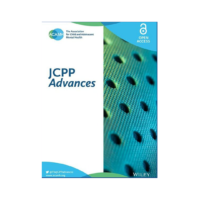COVID-19
-

Why I didn’t send my child back to school after the pandemic: The Rise in Home Education
‘Why I didn’t send my child back to school after the pandemic: The Rise in Home Education’ will be led by Tami Alikhani. This is webinar is organised by ACAMH’s Adverse Childhood Experiences (ACEs) Special Interest Group.
- Event type
- Talk with Q&A
- Location
- LIVE STREAM
-

RESHAPE Study: Key Takeaways
Hosted by Dr. Clara Faria, ‘RESHAPE Study’ series is a new mini-in conversation series that will explore the RESHAPE study and the impact of its findings for parents, teachers, policymakers, and mental health professionals.
In this podcast series, Clara is joined by several guest speakers, all of whom are part of the RESHAPE team, to address a range of issues relevant to child and adolescent wellbeing and mental health and what the RESHAPE findings show with regards to how theses issues impact on young peoples’ mental wellbeing.
Read more -

JCPP Editorial: Volume 64, Issue 08, August 2023
Editorial “Developmental considerations in addressing the earlier age of severe eating disorder onset” by Rebecca C. Kamody and Michael H. Bloch
Read more -

JCPP Advances: Volume 3, Issue 02, June 2023
JCPP Advances June 2023 Issue is now available to read.
Read more -

Covid-19’s impact on Loneliness and Mental Health: A Study of Schizotypal Traits and Paranoia
The Covid pandemic lockdown has affected us differently, with some people being impacted more than others. Extensive research has indicated that lockdowns – which broadly include isolation measures, such as, in the UK, being required to stay at home unless for essential reasons – have disproportionately impacted individuals with higher levels of paranoia.
Read more -

Investigating the impact of the COVID-19 pandemic on older adolescents’ psychological wellbeing and self-identified cognitive difficulties
Open Access paper from JCPP Advances – ‘The COVID-19 pandemic coincides with growing concern regarding the mental health of young people. […] At three timepoints, independent samples of young people aged 16–18 years completed an online survey. Data collection coincided with periods of lockdown and young people returning to school. The survey assessed subjective impacts of the pandemic on overall wellbeing, anxiety and cognitive function.’ Meg Attwood (pic) et al.
Read more -

Editorial Perspective: When is a ‘small effect’ actually large and impactful?
Open Access paper from the JCPP – ‘In this short review, we utilise simulations to demonstrate that a relatively small shift in mean scores on mental health measures can indicate a large shift in the number of cases of anxiety and depression when scaled up to an entire population. This shows that ‘small’ effect sizes can in some contexts be large and impactful.’ Emma Grace Carey et al.
Read more -

Changes in UK pre-schooler’s mental health symptoms over the first year of the COVID-19 pandemic: Data from Co-SPYCE study
Open Access paper from JCPP Advances – ‘We conducted an intensive longitudinal, but not nationally representative, study to examine trajectories of pre-schoolers’ mental symptoms in the United Kingdom during the first year of the COVID-19 pandemic.’ Peter J. Lawrence (pic) et al.
Read more -

Changes in UK parental mental health symptoms over 10 months of the COVID-19 pandemic
Open Access paper from JCPP Advances – ‘The threats to health, associated restrictions and economic consequences of the COVID-19 pandemic have been linked to increases in mental health difficulties for many. Parents, in particular, have experienced many challenges such as having to combine work with home-schooling their children and other caring responsibilities’. Simona Skripkauskaite (pic) et al.
Read more -

The effects of COVID-19 on child mental health: Biannual assessments up to April 2022 in a clinical and two general population samples
Open Access paper from JCPP Advances – ‘We examined how child mental health has developed since the start of the COVID-19 pandemic up to 2 years into the pandemic (April 2022). We included children (age 8–18) from two general population samples and one clinical sample receiving psychiatric care.’ Josjan Zijlmans (pic) et al.
Read more